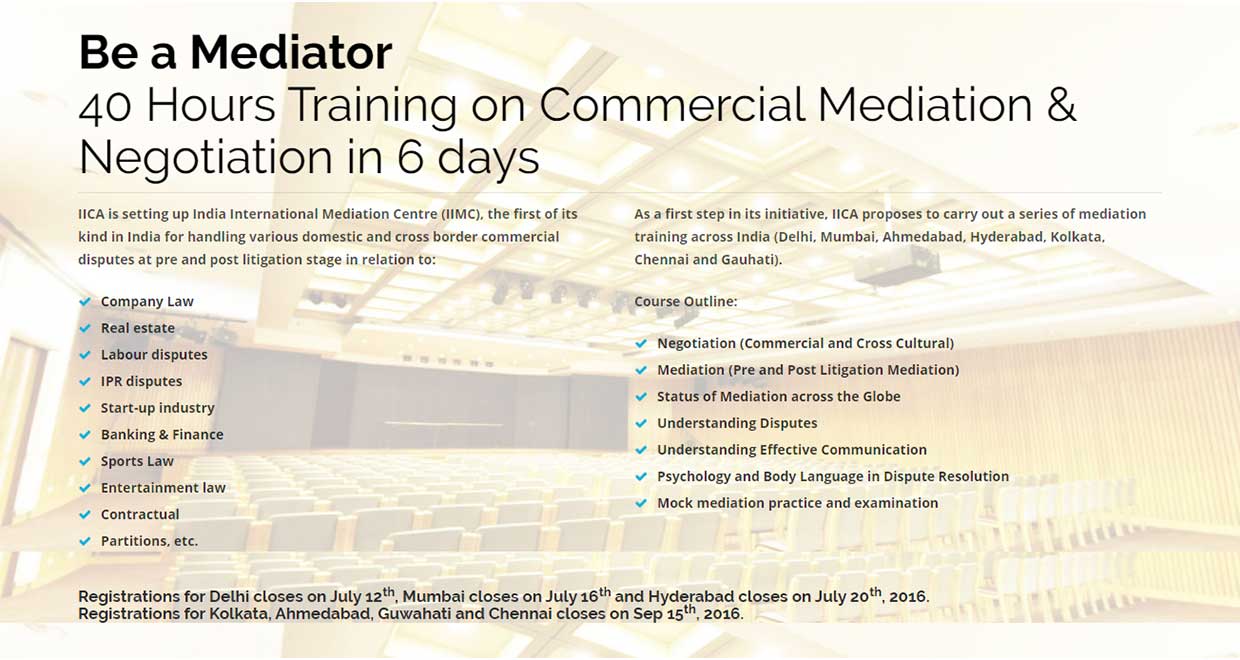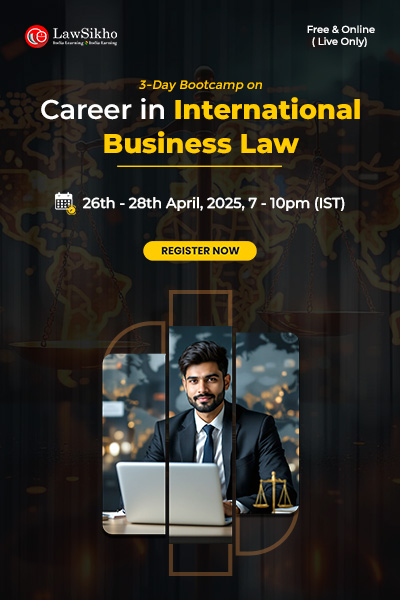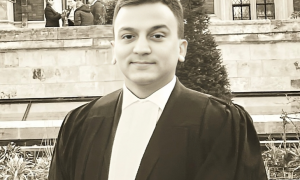Indian Institute of Corporate Affairs (IICA) is in the process of setting up India International Mediation Centre (IIMC), the first of its kind in India for handling various domestic and cross border commercial disputes at pre and post litigation stage. As a first step in its initiative, IICA proposes to carry out a series of mediation training across India (Delhi, Mumbai, Ahmedabad, Hyderabad, Kolkata, Chennai and Gauhati).
The team responsible for conduct of the training program is headed by Dr. Vijay Kumar Singh, head of the School of Corporate Law and Associate Professor at IICA. Vijay has previously worked as Deputy Director (Law) at Competition Commission of India. He is a trained mediator from The International Centre for Alternative Dispute Resolution (ICADR). He is also a certified trainer on “Managing Disputes and Difficult Conversations on the Board” by Centre for Effective Dispute Resolution (CEDR) and the IFC Corporate Governance Group.
Vijay is assisted by Anuroop Omkar and Kritika Krishnamurthy as consultants for the course. While Anuroop is a trained mediator from USA and Europe, Kritika is trained from The International Centre for Alternative Dispute Resolution (ICADR). They are Fellows of World Mediation Organization (WMO), Berlin, Germany. Anuroop is the youngest mediator appointed by Delhi Dispute Resolution Society, Ministry of Law and Justice, New Delhi.
In this interview, they talk about
- The need for mediation as a means of dispute resolution and its future in India
- Their upcoming training programme and what they hope people will gain from it
- The number of different types of people in different fields that will benefit from both their training programme and mediation skills in general.
Tell us a bit about your team
Vijay: Our team is headed by Dr. Bhaskar Chatterjee, Director General and CEO of Indian Institute of Corporate Affairs (IICA). Dr. Chatterjee is an ex IAS officer and has introduced the concept of CSR in India, as the first principles of CSR for the Public Sector Enterprises were written during his tenure as Secretary, DPE. His work experience has given him wide exposure in negotiation and experience of the fallacies of dispute resolution mechanisms prevalent in India. He believes corporate India is in great need of mediation which saves not only time and money but also goodwill of disputants. I am the Course Director for the training program. I am also the Head of School of Corporate Law at IICA. Before IICA I was working as a Deputy Director at the Competition Commission of India. Anuroop Omkar and Kritika Krishnamurthy are our course consultants. They are practising corporate lawyers, mediators and co-authors of the book ‘The Art of Negotiation and Mediation- Wish Bone, Funny Bone and Backbone’ by LexisNexis.
What made you conceive the idea of mediation training and International Centre of Mediation when arbitration and litigation are the most accepted ways of dispute resolution?
Vijay: Time and again we harp on the fact of the overburdened courts in India and the escalating cost of undertaking arbitration which many times leads to court appeals. India is on the way of becoming the global business hub of the world. We are strong propagators of the ‘ease of doing business’ but our rankings are dismal. Most foreign investors and joint venture partners are hesitant of the Indian market because of the stories they have heard of long drawn litigations in India. We need an efficacious dispute resolution mechanism for commercial disputes and mediation is the right fit. Mediation has a success rate of 80-85% in developed jurisdictions. Businesses shall get the chance to negotiate a solution to their own disputes with promise of full confidentiality. But there is lack of trained mediators in India who truly understand the essence of what mediation should be as an experience for disputants. We are on the lookout of promising mediators who can help disputants settle differences in a relaxed, informal atmosphere without prejudice. Hence, the mediation trainings- to train and empanel mediators for our proposed mediation centres.
Where do you plan to set up the International Mediation Centre?
Vijay: Of course, we would like to begin with our home ground which is New Delhi. But if we get the right talent pool and collaborations, we wish to set up mediation centres all over India; particularly in the cities where the trainings are planned- New Delhi, Mumbai, Ahmedabad, Hyderabad, Chennai, Kolkata, and Gauhati for the businesses in the North East of India. In our second phase, we may also target other industrial and emerging business centres in India.
Does this training have any correlation to the NCLT & NCLAT that has been recently brought into force replacing the CLB, which would also exercise powers available with High Courts earlier in certain company law matters?
Vijay: The pioneering step of commencement of National Company Law Tribunals and Appellate Tribunal has already been taken on June 1 this year. Section 442 of Companies Act, 2013 provides for resolution of company law disputes before the tribunals through mediation. Most of the disputes which come under these provisions are shareholder disputes, oppression and mismanagement, winding up of company owing to inability to pay debts, etc. I think these disputes are apt for resolution through mediation since the parties have a lot at stake and there is scope for win-win solutions and beneficial commercial arrangements through assisted negotiations. If given an opportunity we would be glad to assist the NCLT and NCLAT in mediation of these disputes. We also wish to promote pre-litigation of commercial disputes in India.
Where all are the trainings happening and what is the duration of each training?
Kritika: The trainings shall follow the international certification format of 40 hours. The training shall be for 6 days from 2 PM onwards at the following places:
New Delhi: 19-24 July, 2016
Mumbai: 25-30 July, 2016
Hyderabad: 31 July-5 August, 2016
Ahmedabad: 1-6 November, 2016
Kolkata: 7-12 November, 2016
Gauhati: 13-18 November, 2016
Chennai: 19-24 November, 2016
What should the course participants expect from the training program?
Anuroop: Participants should expect skill based learning. Becoming a mediator requires a psychological change in your perception towards disputes. We cannot bring about this change in the participant’s mindset through only one-sided classroom teaching. The training program will also have extensive mock mediation practice and other skill based exercises to engage the participants in the training process and give the participants an actual practical insight into the practice of mediation. The training will equip the participants to deal with difficult disputants and deadlocks in negotiation. These skills are not just useful for a mediator but any corporate professional.
For whom shall this training be beneficial to attend?
Kritika: The training is for any person who wishes to become a mediator. It is not necessary for them to be a practising lawyer since we all face disputes and negotiate in everyday life. However, here is a tentative list of persons for whom this training shall be beneficial:
- Judges
- Advocates
- In house counsels
- Chartered Accountants
- Company Secretaries
- Cost & Work Accountants
- Bureaucrats & public servants
- Members of National Tribunals
- Members of National, State and District Consumer Forums
- Professional Students
- Faculty (Law, CA, CS, Management, Commerce etc.)
- Bankers
- Members and employees of various sector regulators
- Social Workers
- Entrepreneurs & Working Professionals
- HR and Management Professionals
We welcome both active practioners and superannuated professionals
Who will be Training faculty for the Mediation Training and why?
Vijay: Avv. Stefano Cardinale shall be the Master Trainer for all the training programs. Avv. Cardinale is currently a member of the order in Rome and Barcelona, where he practices as a lawyer, professional negotiator, mediator, international management consultant and trainer. He is external independent expert of the EU Commission. He runs his own law firm Legal and Consulting International with offices all over the world. He has been guest speaker in international conflict management and mediation lectures at the World Trade Center of San Diego, at University of California San Diego (USA), at the American Chamber of Commerce of Milan, at the International Development Law Organization, at Magna Graecia University of Catanzaro, at Verona University, at Padova University (Italy), at Kharkov Law School (Ukraine), at Bar Council of India Golden Jubilee Celebrations in 2012 (India).
The co trainers for the training program shall be practicing mediators from India so that the participants shall get exposure to the international best practices of mediation as well as their applicability in the Indian scenario.
A tree cannot flourish unless we nourish its roots. Mediation needs to be taught by actively practising international mediators so that the first batch of commercial mediators for the India International Mediation Centre understand the right approach and mindset required to conduct mediation. Mediation fails many times not for any other reason other than faulty practises and hasty mediators. We wish to avoid that. Mediation has set best practices and if we introduce them in India with required customization, it will soon catch up in India. But we need good international exposure.
Where do you see mediation as a practice of dispute resolution in next 5 years’ time?
Anuroop: With increasing popularity and success of campaigns such as Startup India, Stand up India and Make in India, India is developing a new brand of entrepreneurs. They are looking for innovative dispute resolution mechanisms which will allow them constructive closure in disputes so that they can devote more time in business development. Business houses will any day choose a mechanism where they have a say in the outcome over a mechanism where there is a win-lose result. If India can learn to recycle, we can also learn to make business out of disputes. With the changing face of corporate India, the dispute resolution mechanism shall also have to keep pace. In the next five years, we see mediation as the ‘Go-to Mechanism’ for commercial disputes in India.
Any advice for the future commercial mediators of India?
Anuroop: Mediation has been widely accepted as one of the most preferred dispute resolution mechanism in the world. It has got an acceptance because of its broad elements which includes empathy towards disputants, time effectiveness, confidentiality and win-win solution. Various countries in the world have gone upto legislate mediation as a mandatory practice before resorting to the judicial system. My advice to the future mediators would be- in order to effectively and efficiently advice both domestic and international business houses in India we should understand that time, money and confidentiality hold a great importance to them. Keeping that in mind, we should advise them and structure their various contracts and agreements with an effective dispute resolution clause with mandatory mediation before resort to any other dispute resolution mechanism.


























